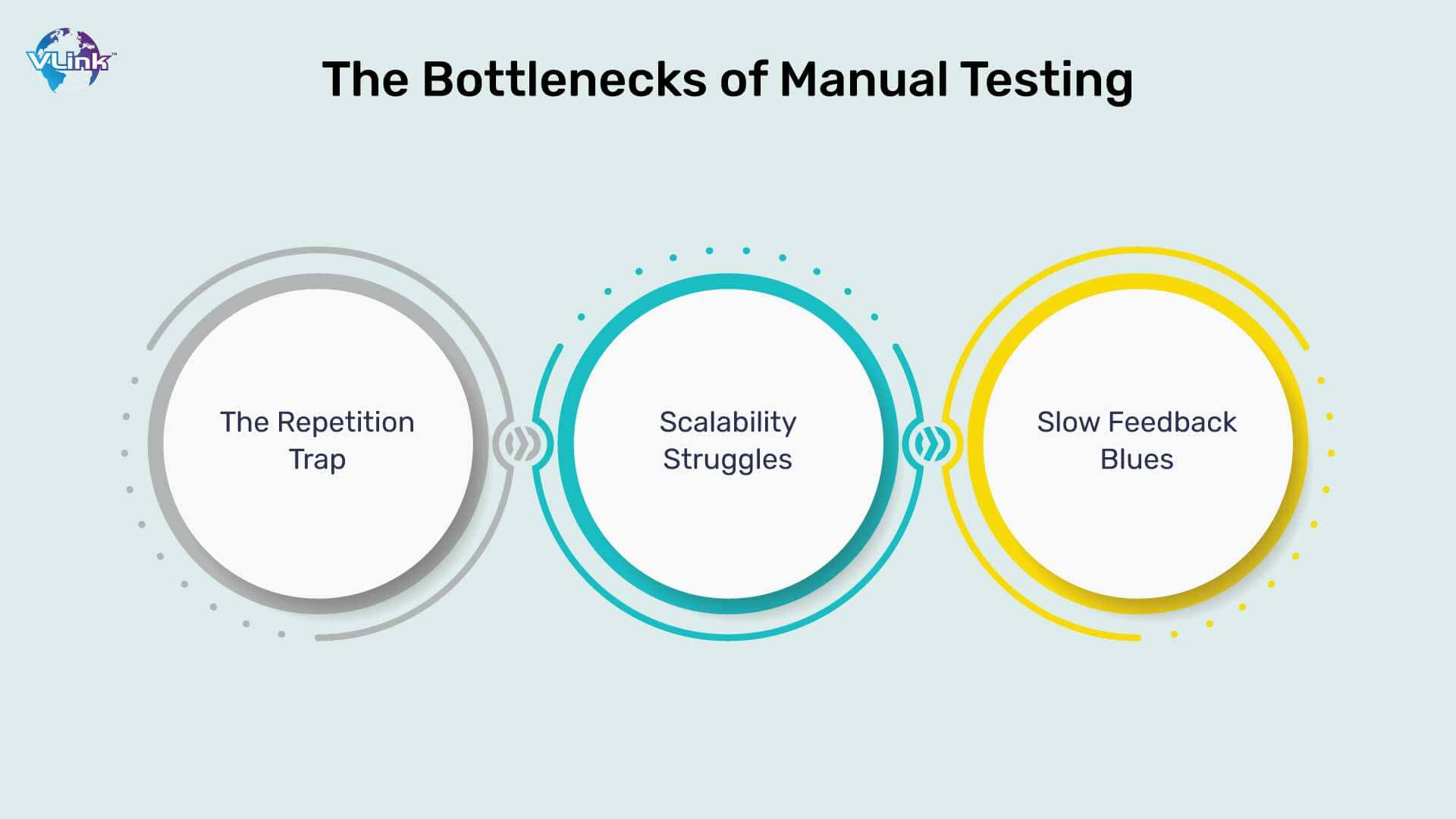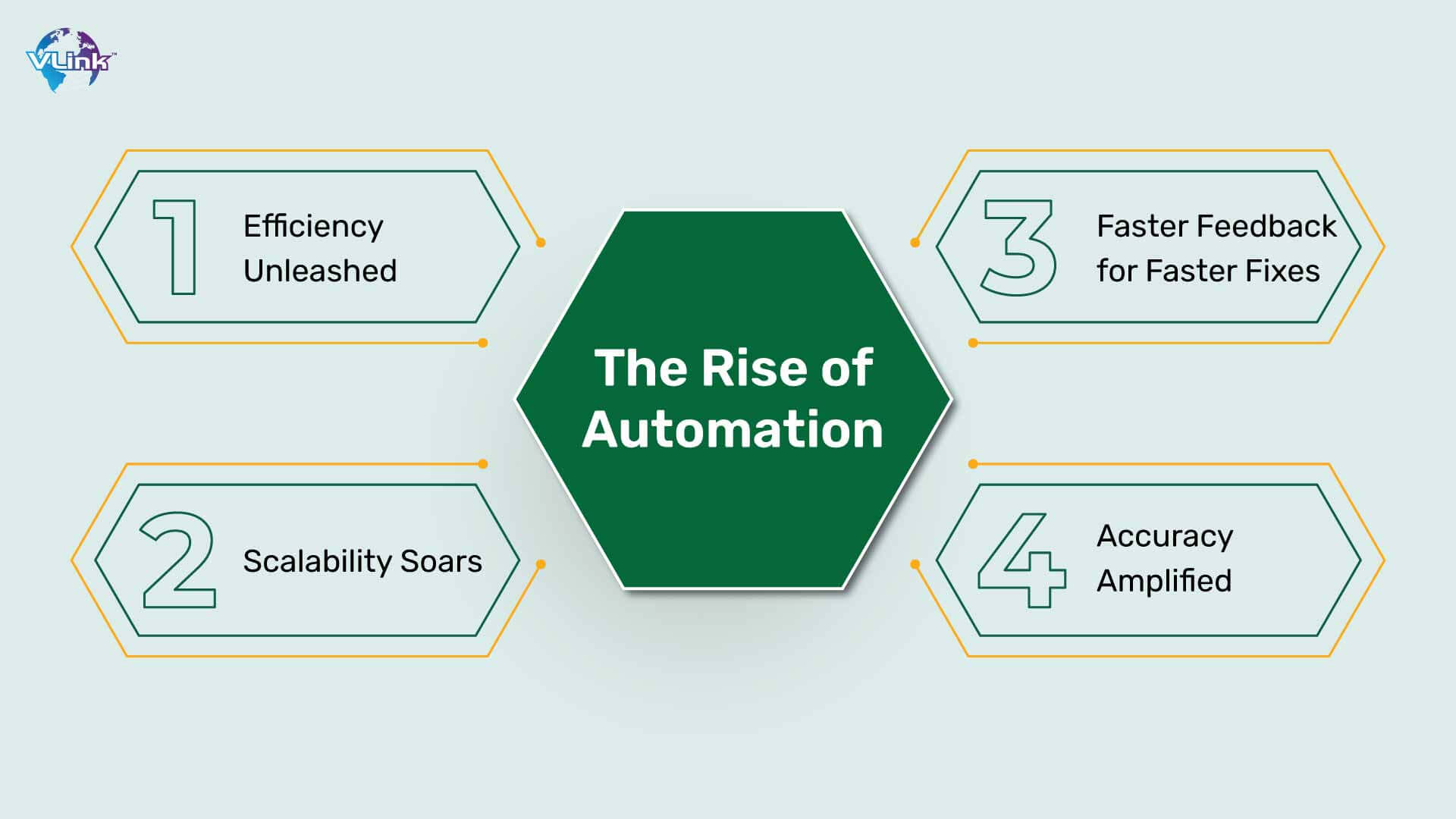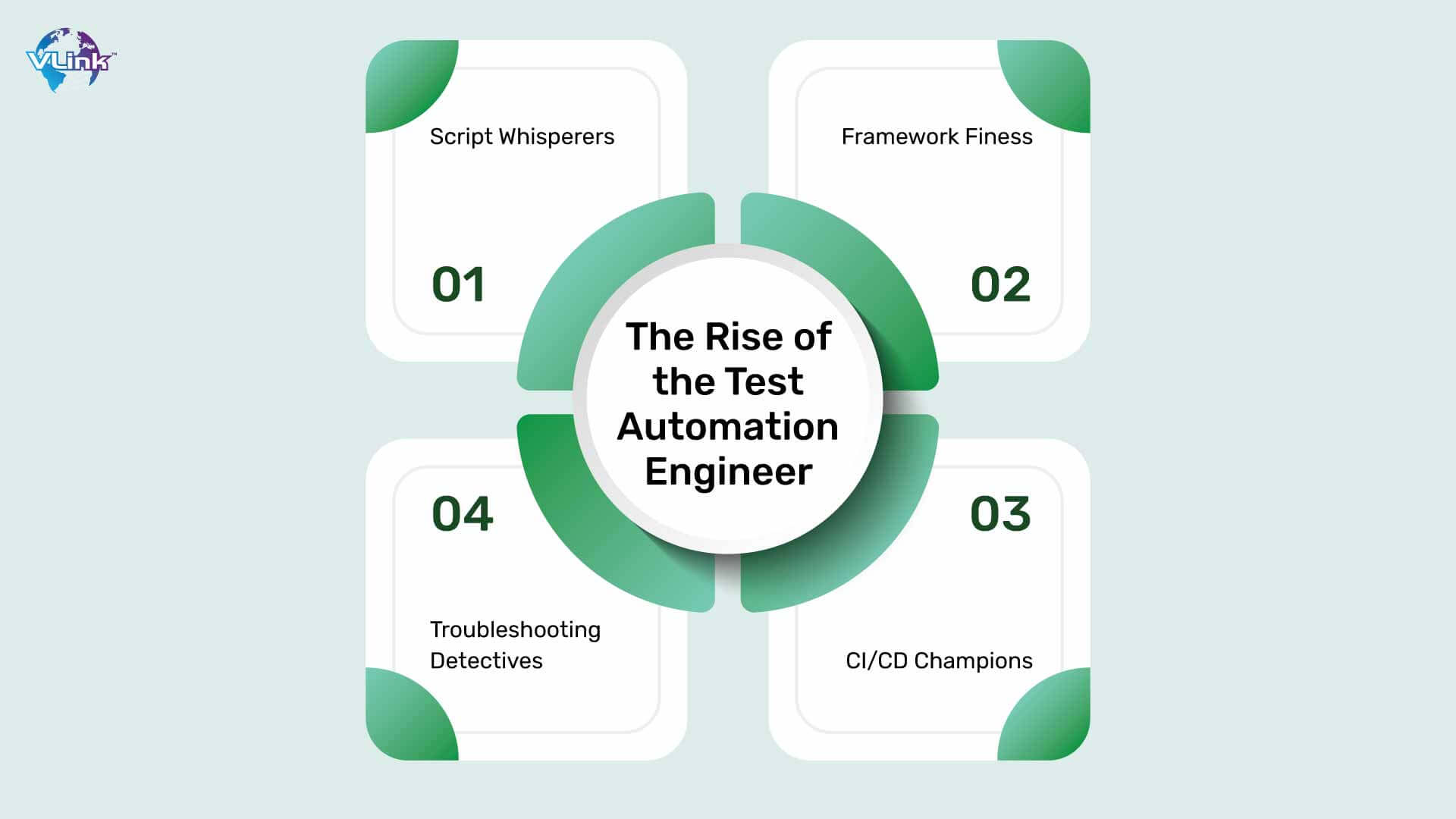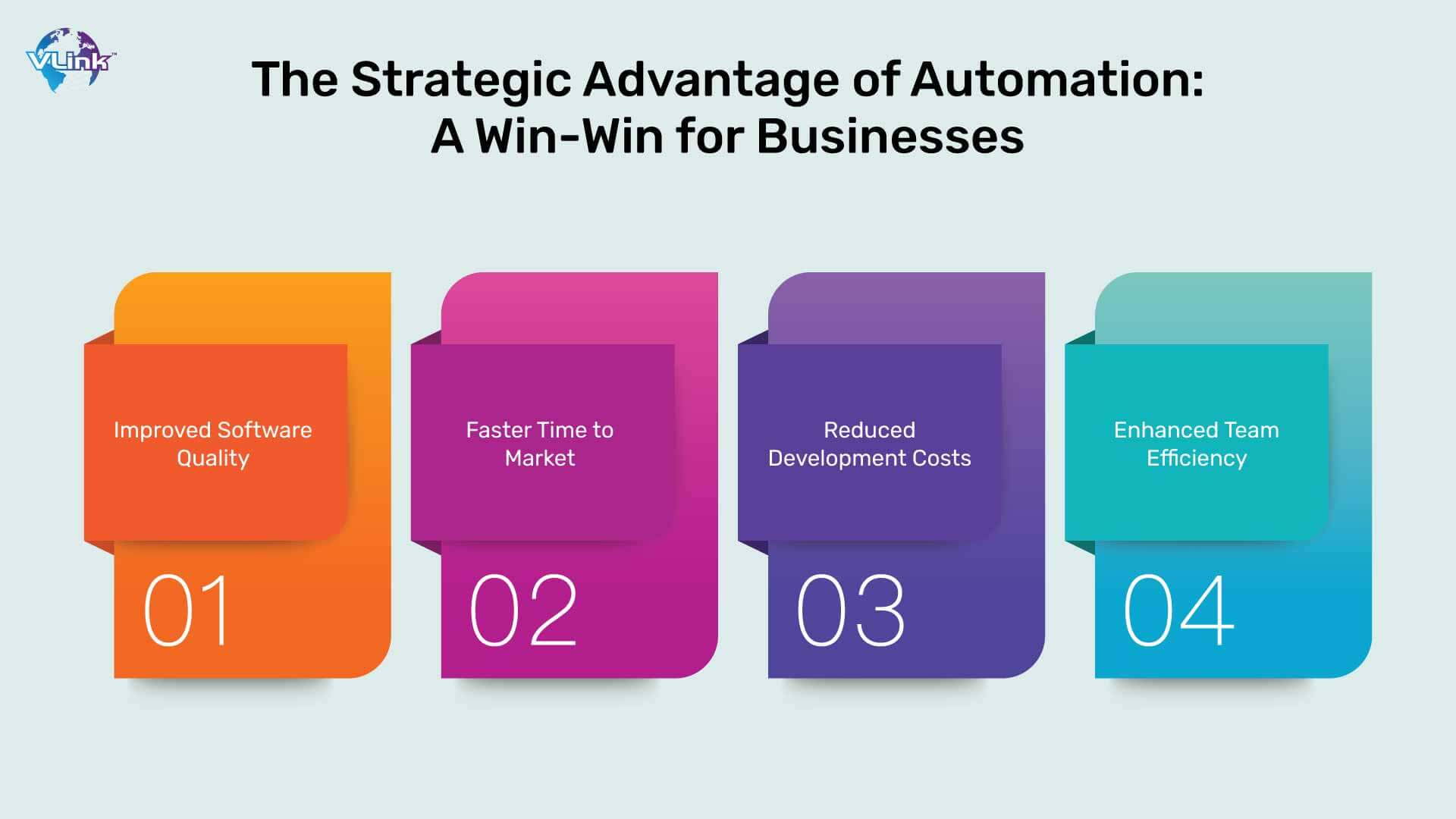In the world of software development, ensuring quality is paramount. For years, manual testing – the process of meticulously reviewing an application function by function – has been the cornerstone of achieving this. However, with the growing complexity of software and the demand for faster release cycles, manual testing can become time-consuming and inefficient.
This is where test automation comes in. By automating repetitive test cases, testers can free up their time to focus on more strategic tasks, like exploratory testing and edge-case scenario creation. This blog post will explore the rise of test automation, the emergence of the Test Automation Engineer (SDET) role, and how this trend is shaping the future of Quality Assurance (QA) in the ever-evolving software development landscape.
Let's start!
The Bottlenecks of Manual Testing

While manual testing remains a crucial component of the QA process, its limitations become increasingly apparent in the fast-paced world of agile development:
- The Repetition Trap:
Running the same tests repeatedly, especially for regression purposes, can be tedious. Verifying hundreds of steps just to make sure a small bug fix didn't cause unintended issues can be a real time-suck. Re-running tests all the time can get tiring for testers, making them less productive.
- Scalability Struggles:
Testing complex applications with tons of features is a big hassle for manual testers. Imagine a giant online store with thousands of products and different payment options. Testing everything by hand would take forever and be very difficult to manage. As applications get more complex, keeping up with manual testing becomes a real struggle.
- Slow Feedback Blues:
Manual testing often creates bottlenecks in the development pipeline. Identifying and resolving bugs takes longer, slowing down the entire release process. This can significantly hamper development velocity and impact time-to-market. Waiting for manual testing results can delay bug fixes and slow the software development cycle.
These limitations highlight the need for a more efficient and scalable testing solution. Enter the stage: test automation.
Read More: Software Testing & QA Best Practices for Enterprises
The Rise of Automation: Efficiency, Speed, and Scalability

The need for a more efficient and scalable testing solution led to the rise of test automation. Instead of manually clicking through everything, testers can use automation tools to write instructions that act like a user. These tools, called automation frameworks, let testers write scripts in a programming language to automatically run their test cases.
This approach offers several key advantages:
- Efficiency Unleashed:
Repetitive tasks are automated, freeing up tester time for more strategic activities like exploratory testing and crafting high-impact test cases. Imagine the power of automated regression testing, freeing your QA team to focus on uncovering deeper issues and exploring edge cases.
- Scalability Soars:
Automation scripts can be easily scaled to accommodate an expanding application with new features and functionalities. No more scrambling to test every new addition manually – automation scripts can seamlessly adapt and grow with your application. Adding new features or functionalities no longer requires a significant increase in manual testing effort.
- Faster Feedback for Faster Fixes:
Automated tests can be integrated into the CI/CD pipeline, enabling faster bug detection and quicker fixes. This creates a smoother development flow, where bugs are identified and addressed early, leading to higher-quality software. Faster feedback loops ensure bugs are caught and resolved sooner, leading to a more efficient development process.
- Accuracy Amplified:
Automation scripts minimize human error, producing more reliable and consistent testing results. You can rely on Automation's unwavering precision to ensure consistent testing every single time. Automation helps eliminate inconsistencies from manual testing, leading to more reliable test results.
Read More: Hire Automation Testing Engineer Remotely in 48 hours
The Agile Method: QA and Automation Working in Harmony
It's crucial to understand that Automation doesn't replace manual testing entirely. They form a complementary duo within the QA process, each with its strengths:
- Manual Testing: The Human Touch Advantage: Ideal for exploratory testing, usability evaluation, and edge-case scenarios that are difficult to automate. Here, the human ability to think creatively and adapt to unforeseen situations is invaluable. Manual testing allows testers to explore the application intuitively, identify usability issues, and uncover unexpected bugs.
- Test Automation: The Efficiency Engine: Automation is excellent for regression testing, ensuring core functionalities remain intact after code changes. Automation scripts provide a reliable and efficient way to re-run the same tests repeatedly. Automation excels at handling repetitive tasks, freeing testers to focus on more strategic activities.
- The key lies in striking a balance between the two approaches. This "Agile Method" requires strong collaboration between QA testers and automation engineers to ensure comprehensive and efficient software testing. Effective communication and collaboration are essential to strategically implementing Automation and complementing manual testing efforts.
The Rise of the Test Automation Engineer

The growing need for automation expertise has resulted in the emergence of the Test Automation Engineer role. These specialists combine a strong understanding of software development principles with expertise in automation frameworks, scripting languages, and testing methodologies. They are the architects of the automation strategy, the code whisperers who craft the scripts that streamline the testing process.
Here's a glimpse into the world of a Test Automation Engineer:
- Script Whisperers: Designing and developing automated test scripts using languages like Python, Java, or JavaScript is their bread and butter. They understand the intricacies of these languages and can write efficient and maintainable scripts that interact effectively with the application under test.
- Framework Finess: Their forte is selecting and implementing appropriate automation frameworks and tools based on project requirements. From choosing the proper framework like Selenium or Cypress to leveraging powerful tools like Appium for mobile testing, they ensure the right fit for the job. They deeply understand different automation frameworks and tools, allowing them to select the most effective solution for each project.
- CI/CD Champions: Integrating automated tests into the CI/CD pipeline for seamless testing throughout the development lifecycle is a key responsibility. They ensure Automation becomes a smooth and efficient part of the development process. Integrating Automation into the CI/CD pipeline enables early detection of bugs and ensures that high-quality code is continuously delivered.
- Troubleshooting Detectives: Maintaining and troubleshooting automated tests to ensure their effectiveness and accuracy is ongoing. They are the problem solvers who keep the automation engine running smoothly. When tests fail, they possess the analytical skills to identify the root cause and fix the issue, ensuring the continued effectiveness of the automation suite.
Read More: Hire the Top 5% of Test Automation Engineers | Fixed Cost, Hourly or Monthly
Beyond Scripting: The Broader Skillset of a Test Automation Engineer
While scripting skills are essential, becoming a successful Test Automation Engineer requires a broader skillset:
- Software Development Fundamentals:
A firm grasp of lifecycles, object-oriented programming concepts, and design patterns is crucial for creating robust and maintainable test scripts. Understanding the underlying code structure allows them to write scripts that interact effectively with the application and target specific functionalities.
- Testing Methodologies:
Knowledge of various testing methodologies, such as black-box testing, white-box testing, API testing, and performance testing, is essential for designing comprehensive test plans. They can leverage different testing approaches to ensure that all aspects of the application, from the user interface to the underlying functionality, are thoroughly examined.
Read More: Difference Between Performance, API, And UI Testing
- Analytical Thinking and Problem-Solving Skills:
Debugging failing tests and identifying root causes requires strong analytical skills. Test Automation Engineers must be adept at thinking critically, breaking down problems, and finding solutions to keep the automation process running smoothly. Analytical skills are essential for troubleshooting automation issues and ensuring the continued reliability of the test suite.
- Communication and Collaboration Champions:
Effective communication with developers and other QA team members is vital for the seamless integration of Automation into the development process. They must clearly articulate testing goals, explain automation strategies, and collaborate effectively to ensure everyone is on the same page. Strong communication and collaboration skills are crucial for working effectively with developers, testers, and other stakeholders to ensure successful implementation of Automation.
The Future of QA: A Journey of Continuous Learning
The landscape of software development and testing is constantly evolving. New automation tools, frameworks, and methodologies are continuously emerging. For Test Automation Engineers, a commitment to continuous learning is crucial:
- Staying Ahead of the Curve:
It is essential to stay updated on the latest trends and technologies in automation testing. This involves actively following industry publications, attending conferences and workshops, and engaging with online communities. By staying up-to-date with the latest advancements, they can ensure that their skillset remains relevant and that they can implement the most effective automation solutions.
- Building a Knowledge Network:
Actively engaging with online communities and forums allows Test Automation Engineers to share knowledge and learn from fellow automation professionals. Participating in discussions, asking questions, and contributing to the collective knowledge base is invaluable. Collaboration and knowledge sharing within the automation testing community allow them to learn from others and stay at the forefront of the field.
- Upskilling for the Future:
Participating in workshops, conferences, and online courses provides opportunities to enhance their skills. Whether exploring new automation frameworks, delving deeper into specific programming languages, or learning about cutting-edge testing methodologies, continuous learning is critical to staying relevant. By continuously upskilling themselves, they can ensure they possess the necessary skills to tackle the challenges of tomorrow's testing landscape.
Read More: The Future of Software Testing: Why You Need an Automation Test Engineer?
The Strategic Advantage of Automation: A Win-Win for Businesses

The transition towards a more automated testing approach signifies a strategic shift in the QA landscape. By leveraging test automation effectively, QA teams can achieve several key benefits:
- Improved Software Quality: Automation helps catch regressions early and often, leading to higher-quality software releases. By automating repetitive test cases, they can ensure consistent testing and identify bugs early in the development lifecycle.
- Faster Time to Market: Efficient and scalable testing processes enable quicker delivery cycles, allowing businesses to get their products to market faster. Automation handling repetitive tasks makes testing cycles shorter, allowing for faster releases and speedier response to market demands.
- Reduced Development Costs: Automating repetitive tasks frees up valuable testing resources, leading to long-term cost savings. Automation can also significantly reduce the time and effort required for manual testing, saving development teams money.
- Enhanced Team Efficiency: Testers can focus on more strategic tasks, leading to a more productive and efficient QA team. Automation frees up testers to focus on exploratory testing, investigating complex bugs, and collaborating with developers to improve the overall quality of the software.
The Road Ahead: Embracing the Future of QA
The rise of Automation doesn't signal the end of manual testing. Instead, it represents a new chapter in the QA journey, where Automation and human expertise work harmoniously. Test Automation Engineers play a pivotal role in this evolution, leveraging their unique skill set to create a more efficient, scalable, and ultimately, more effective testing process.
As we look towards the future, here are some key trends that will shape the landscape of QA:
- The Rise of AI and Machine Learning: Incorporation of AI and machine learning techniques into automation testing holds immense potential. These technologies can automate tasks like test case generation, self-healing tests, and anomaly detection.
- The Evolving Role of the QA Engineer: As Automation becomes more sophisticated, the role of the QA Engineer will continue to evolve. Testers will likely shift their focus towards higher-level strategic testing, leveraging Automation to free up time for user experience, security, and performance testing.
- The Continuous Testing Mindset: The emphasis will be on continuous testing throughout the development lifecycle. Automation will seamlessly integrate into the CI/CD pipeline, enabling continuous feedback and faster bug identification.
By embracing these trends and fostering a culture of continuous learning, Test Automation Engineers will be instrumental in ensuring the quality and success of software in the years to come. The future of QA is bright, and it's a future where Automation and human expertise work together to deliver exceptional software experiences.
Read More: Exploring the Different Types of Software Testing Services: A Comprehensive Guide
Wrapping Up!
In conclusion, the rise of Automation has redefined the role of the QA Engineer. The Test Automation Engineer has emerged as a critical player in the development process, leveraging Automation to improve efficiency, scalability, and the quality of the built software. As technology keeps changing, the future of software testing will likely involve an even stronger partnership between automation tools and the irreplaceable expertise of testers.
By embracing continuous learning and fostering a collaborative environment, Test Automation Engineers will be instrumental in ensuring the quality and success of software in the years to come. If you are considering transitioning to automated testing or need help building your test automation team, we can help. Contact us today to learn more about our test automation services and how we can assist you in achieving your software quality goals.
Frequently Asked Questions
Test Automation involves using scripts and frameworks to automate repetitive testing tasks. This frees QA testers to focus on more strategic activities like exploratory testing and edge-case scenario exploration.
There are several advantages to using Test Automation, including:
- Increased Efficiency: Automating repetitive tasks saves time and allows testers to focus on higher-value activities.
- Improved Scalability: Automation scripts can be easily scaled to accommodate an expanding application with new features and functionalities.
- Faster Feedback Loops: Automated tests can be integrated into the CI/CD pipeline, enabling faster bug detection and quicker fixes.
- Enhanced Accuracy: Automation scripts minimize human error, leading to more reliable and consistent testing results.
While scripting skills are essential, successful Test Automation Engineers possess a broader skillset, including:
- Software Development Fundamentals (SDLC, object-oriented programming)
- Testing Methodologies (black-box testing, white-box testing, API testing)
- Analytical Thinking and Problem-Solving Skills
- Communication and Collaboration Skills
No, Test Automation and Manual Testing are complementary approaches. Automation excels at handling repetitive tasks, while manual testing remains crucial for exploratory testing, usability evaluation, and edge-case scenarios
The future of QA will likely involve a continued dance between Automation and human expertise. We expect to see the rise of AI and Machine Learning in testing, an evolving role for QA Engineers focusing on strategic testing, and a continuous testing mindset embedded throughout the development lifecycle.









